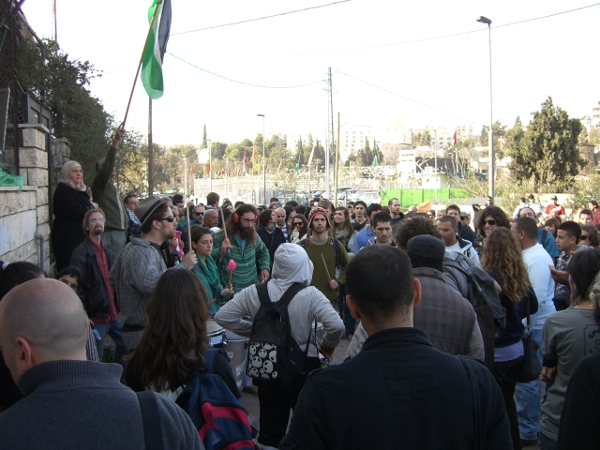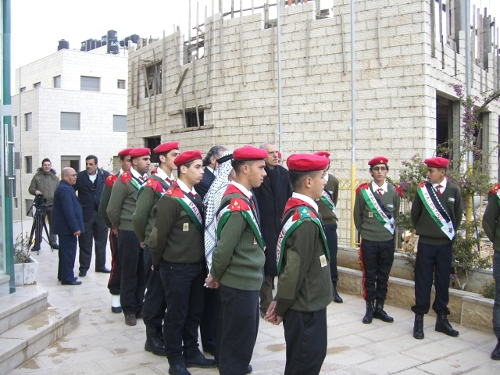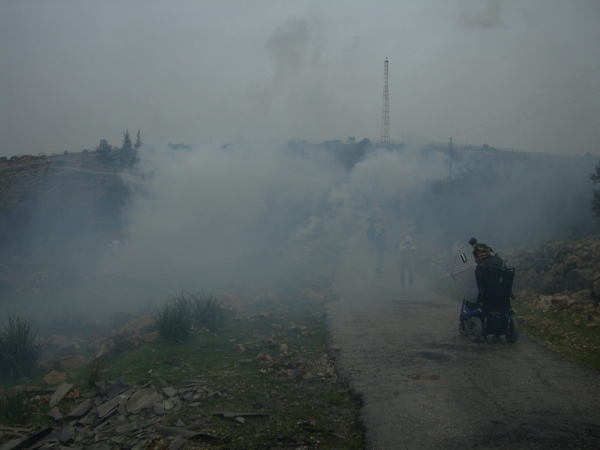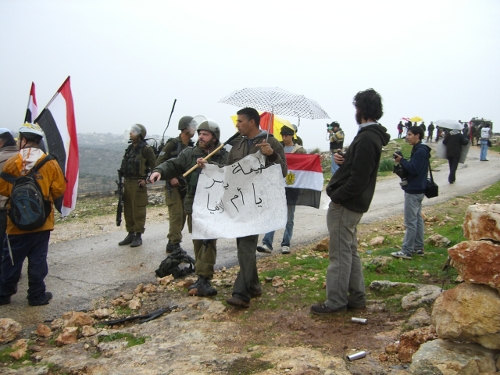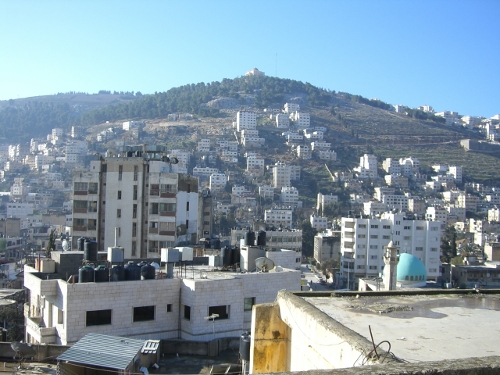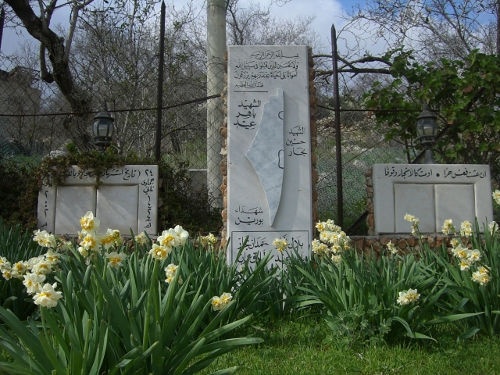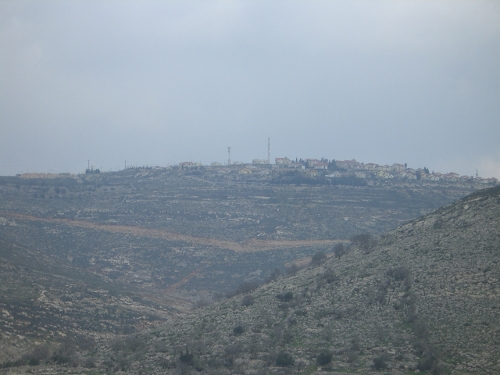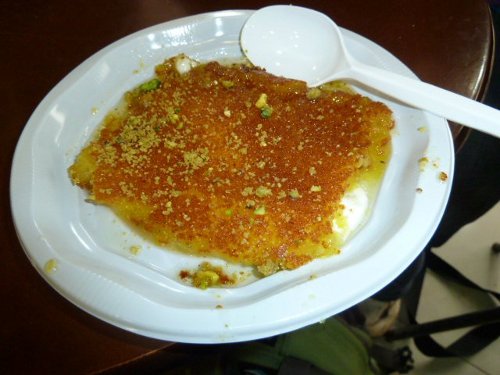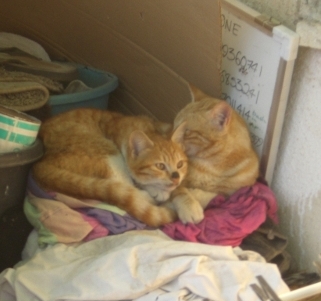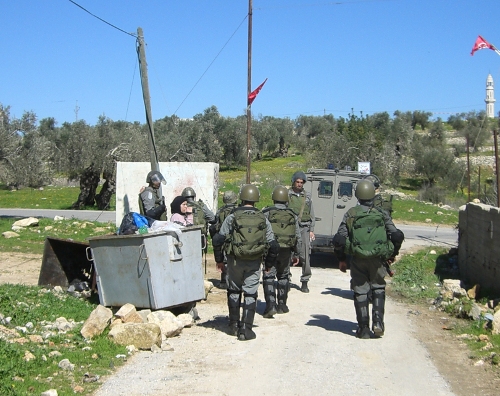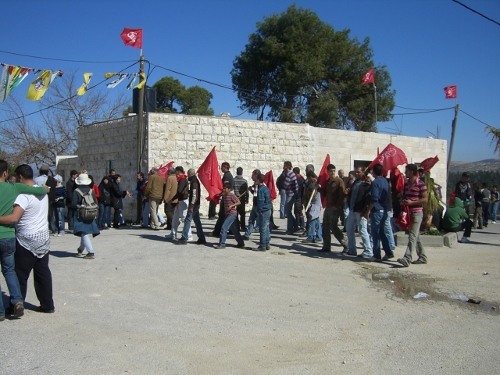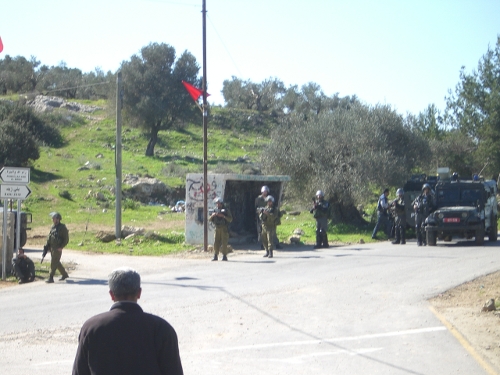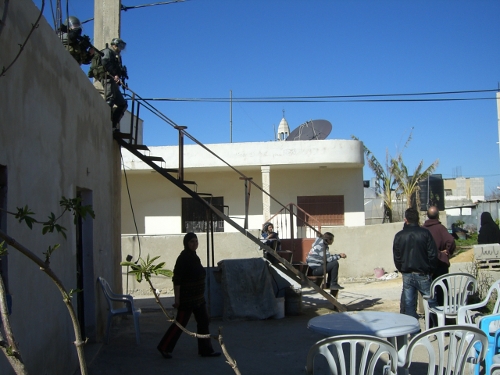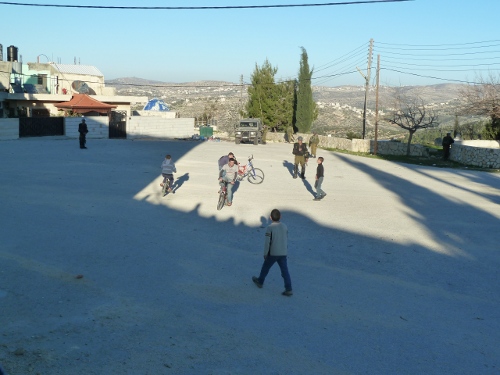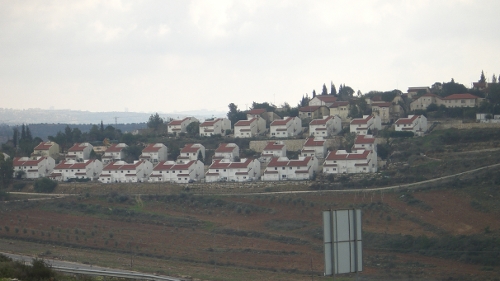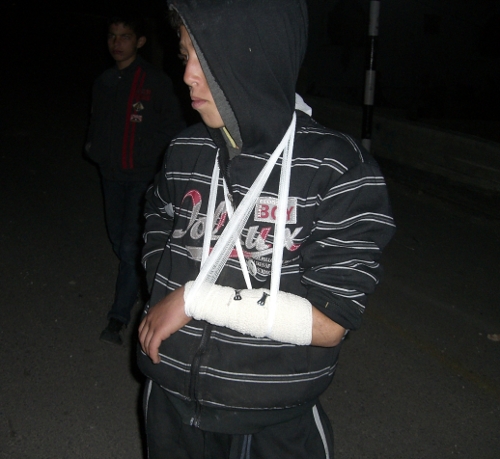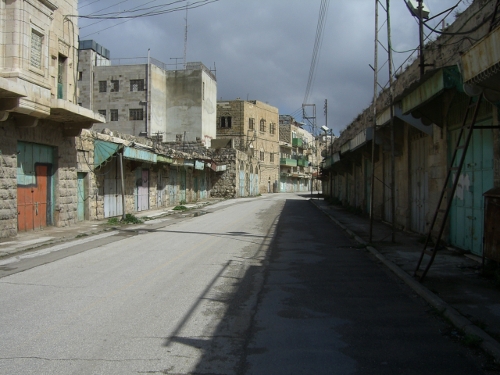Arrival
After several friends had recently been refused entry at Ben Gurion aiport, I was somewhat anxious about what would happen. I suppose I was philosophical, though. If I was put on the next plane back, it wasn’t a problem. Perhaps I should be proud of the fact that I’d become an ‘undesirable’. Would mean that I was making waves, at least.
In the event, yes, they did know who I was and that I was ISM. I had a story prepared about why I was there at that time and intending to stay for a month — a story which was quite true, just with a few details omitted. Made no difference. As I related it, the girl from immigration just looked at me with an expression of ‘what are you wittering on about, we know who you are’. Not sure if my comment about International Society of Musicians helped.
However, it seems I had a choice. Either agree not to enter ‘Palestinian areas’ or leave now. When I asked the guy to define ‘Palestinian areas’ he just gave an impatient sigh and said ‘you know very well’. So I decided to drop the pretence. ‘Do you mean area A under the Oslo Accords?’ ‘A, B and C’ he replied. ‘I thought area C was under full Israeli control’ I said. Didn’t help. So I suggested the 1967 borders, or perhaps the wall. Still didn’t help.
Anyway, they gave me a visa, and I collected my luggage and headed for Al Quds (the Arabic name for Jerusalem).
Al Quds
It was Friday, so early afternoon I headed for Sheik Jarrah to see if the regular protest was taking place. At least I could go there quite legally. It was, and looked quite good. It was sad to see that the ethnic cleansing that was beginning back in 2008 when I was first there is happening at an accelerating rate.
I’d say, though, that there were a few hundred people at the protest, Palestinians, Israelis and internationals.
In the evening I went to see our contact, and we discussed what I could do while I was there. After that I went back to my hostel and went to bed just after nine, having been up for nearly 48 hours. The next day or two would be spent catching up on sleep and buying a few necessities, and not so necessities.
The next few days I spent as a normal traveller. Met a few people, went for meals in some excellent Palestinian restaurants in Al Quds, and went for drinks in an Israeli bar. A cool bar, as it happens. It is run by and frequented by the ‘leftists’, as they are called. The Israelis who attend the protests at Bil’in etc. and advocate boycott. Noam, the young Israeli who took us there, had obviously mentioned to some of them my predicament, and they were coming up to me and saying “you’re the guy who’s been banned from the West Bank” then proceeded to advise me on what to do. One, from Anarchists Against the Wall, basically told me to ignore it. As long as I wasn’t arrested I should be fine. So I confessed that that was the plan.
Ramallah
A couple of days later I was off to Ramallah for the ISM training. You do the training when you start, and if you’ve been away for more than a year or so. This was my third time.
I remember the feeling as we passed through Qalandia checkpoint. “A step further for me”, I said to my companions. I was now illegal, according to the Israeli state. So what did it have to do with them? I decided to call myself an ‘illegal emigrant’. Seemed the best description.
Bil’in
After the training we all went to one of the weekly Friday protests. I plumped for Bil’in, as I was hoping to meet up with some of my Israeli friends from Boycott from Within.
The protest itself seemed as usual. There was quite a bit of tear gas. The army had positioned themselves this side of the fence, so we couldn’t even get near it. Egypt was at this time in revolution, so there were loads of Egyptian flags. The Popular Committee released a press statement:
Popular Committees Against the Israeli Occupation
Palestine
Press release Date: Feb.4th 2011
The great Arab nation The Egyptian Arab nation; the cradle of great history and future We salute this great Arab nation, our bothers. This is the salute of freedom from the people of Palestine who have been fighting for decades for freedom and independence, and to retain the honor of Arabs. The Palestinian nation is still standing against the Zionist occupation that is seeking to control all the Arab region, aided by the United States of America. To the people of Egypt, standing tall like the pyramids and the great dam, to the heart of this Arab nation, that many thought went into a coma, at a time when Palestinians kept hope that something will come out of the Arab nations regardless of different setbacks and defeats, we kept hope that one day Arab nations will revolt to make one last stand against oppression and bring an end to the Zionist occupation of Palestine and all Arab lands. To the great Egyptian Nation The Palestinians are watching what is happening across the Arab world in general and Egypt in particular with great pride, from one side because of what the nations are reflecting of its will to change internally to a great better future without criminal outside interference, but from the other side with fear of losing direction.
Even though we fully trust the will of this rebelling people to differentiate between the good and the bad, and its ability to bring the revolution back on track, this could only be achieved, our brothers, by determining the goal and achieving national unity.
The goals set by the youth are clear — a decent life and a society that can be up to the local and international challenges that face the people, the country and the nation. Since those demands affect all sections of society and do not go against any group in principle, we ask you, as our blood flows for freedom, do not let outsiders infiltrate and cause a deviation and, God forbid, the loss of this effort for change. This is what our enemy wants — to destroy our hope once more. We see our future with the unification of our Arab nation; this is the great goal of this uprising in Egypt and all over the Arab world which will reflect positively on all the free nations of the world and especially on the Palestinians.
We call upon you from wounded Palestine, the Fathers and the martyrs, the children who still fight the Zionist occupation regardless of oppression, from Palestine that suffers from the internal split among its people, which is like a poisoned dagger in the back, we warn you of internal clash, and we say unity for our Arab nation.
Because our fight is with the Israeli occupation, it is not over until the occupation ends — from our position that this occupation is the common enemy of all Arab nations and the free world; because of its terrorism on this region’s regimes; because it is the source of nation’s suffering, supported by the USA and some other countries; because of our duty to our cause we announce:
- We salute the Egyptian and Tunisian people and reiterate the nation’s right to live in freedom and pride.
- We call for national unity and the preservation of civil peace, and to protect the home front and tolerance among all segments of society, and to deal with conspiracies and foreign projects in order to pass this historic stage successfully.
- We hope that the rebelling Arab people make it their priority to demand from any government or leadership to come to sever their ties with the Israeli occupation and abandon the Egyptian – Israeli peace treaty. We believe it would be better to direct the masses towards the Israeli embassies and interests as an alternative to targeting the capabilities of the Egyptian people and the headquarters of its security.
- We call on all free nations in the world, especially Europe and the U.S., to get out in massive demonstrations on 11 2 2011 to confirm the right of peoples to live in freedom and dignity — a day of anger against the Israeli occupation of Arab land, and as a beginning of the Global Intifada.
Long live Palestine
May god protect the Egyptian Nation
The Popular Committees Against the Israeli Occupation – Palestine
The tear gas started before anyone had got near the soldiers. But we marched anyway, and there was a kind of standoff. We were all standing, some were singing, others shouting protests at the soldiers. Regularly people who were further back tried to come forward, but were repelled by volleys of gas.
At this point, the shebab (youth), had not begun their usual symbolic stone throwing. It only happened as we were walking back to the village. I was caught between the shebab and the army. I decided to scarper, but still found myself in the midst of a load of gas. One of my Israeli friends was, despite being a seasoned veteran of the protest, almost disabled by being in the middle of a large cloud. She had to ask me to help her out of there, as she could barely see.
Afterwards we all went our separate ways. I was heading for Nablus, a place of fond memories.
Nablus
Anyone who’s been to Nablus loves it. It’s a thriving city, with the friendliest people you could meet. A visit to the shops to buy a few supplies nearly always ends with a gift of sweets or fruit. It’s also a centre of the resistance to the occupation. During the intifadas it was a major place of conflict. Nowadays it’s a lot more peaceful, but only because the main resistance now is non-violent.
Our contact there, Wael, was recently in prison for months, where he was interrogated and tortured. That fact is hard to believe when you meet him. He still has the old sense of humour that I remember from my last visit, and is still one of the warmest and friendliest people I know.
There are many illegal settlement around Nablus. They are close to villages which are constantly harassed by them. Two of the most infamous are Yitzar and Bracha. They are inhabited by extremist ideological settlers who believe that the land was given to them by God. They are serious nutjobs. Last time I was here, I spent most of my time sitting or sleeping in the road outside a half-built house that settlers from Bracha kept on trying to burn down.
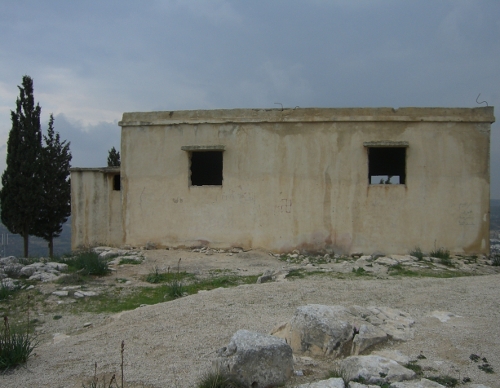
- A house on a hill in Burin, abandoned because settlers and soldiers terrorised the owners
There was still a lot of trouble, and while I was there a nearby village had many homes and livestock sheds demolished by the Israelis. A copy of the demolition order was translated by our Palestinian guide as saying that the land was reserved for Israelis.
We spent our time visiting villages, encouraging them to call us if there was any trouble. On one visit we were at a house in the village of Asira close to Yitzar, which had been attacked by settlers just half an hour earlier.
We also took time to explore Nablus itself, and even managed a sauna and massage in one of the famous turkish baths. And, of course, ate plenty of knafeh, a local delicacy of goat’s cheese, honey and pastry.
An Nabi Salih
The village of An Nabi Salih is very close to an illegal settlement. Every Friday, like many villages around the West Bank, it has a demonstration against the occupation. However, this one tends to be more violently repressed than others by the Israeli army.
The first week we were there, though, it was seen as quite strange. Normally the army move into the village early, and as the march gets under way, the tear gas, sound bombs, rubber-coated steel bullets, and even live ammunition begins. This time it was different. There was very little intervention by the army for the first couple of hours. After that, as the shebab began their symbolic stone throwing, there was some response, but not much. We spent most of the afternoon sitting outside a house. After we left, though, the army moved in and arrested three people.
Next Friday was different. The army and Border Police were seen entering the village in the morning, and they stationed themselves around.
As we tried to get to the march starting point by the mosque, we were stopped by a number of Border Police who told us that the village was a ‘closed military zone’, and if we didn’t leave now, we would be arrested.
We went back to the house where we’d stayed the night, waited a short time, and started out a different way, guided by Neriman, our host’s wife. It meant running across the road hoping the army didn’t see us, then we went up to the mosque to join the others.
After a number of speeches, the march set off. A little down the road the army were waiting. At the head of the march the main group of villagers, internationals and Israelis gingerly moved forward a step at a time. Then, suddenly, all hell broke loose. High velocity tear gas cannisters (shot straight at us, quite illegally), sound bombs and rubber-coated bullets flew our way. We ran for cover.
After the initial volley, some of us crept back down towards the army. They began to move. A jeep drove by me and a few other internationals with it’s door open. I’d seen this in videos of previous demonstrations, so wasn’t surprised when, as it passed us, an arm came out and threw a sound bomb at our feet. Actually, I regretted not taking a video of it. Instead I covered my ears (in a particular way — it’s not good to just press your hands over your ears), and stood there, defiantly. Or vaingloriously. There was quite a concussion from it.
We all moved up to the village square. There were army and Border Police all around. I saw a couple of us filming one group, so went to join them. One of the Border Police who stopped us earlier was there. After a short while, he climbed over the fence between us and came towards us. The Border Police have the power of arrest, and are particularly nasty. In our training we are told to avoid them. So, taking our cue from Neriman, we ran. This was the general scheme of things for the next hour or two. We’d find somewhere they weren’t, until they were, they’d chase us, sometimes shouting ‘we’ll arrest you’, we’d scarper. Once, one of them shouted something, presumably in Hebrew. I don’t know what it was, but I don’t think it was ‘have a nice day’. Then he threw another sound bomb at us. We escaped by running very fast and jumping down a six foot trench. We weren’t sure where to go, but the villagers, many of whom were sitting outside their houses, would gesture to us if it was safe, or if not. If necessary — and one or two had to when they got separated — we could take refuge in anyone’s house.
Finally we saw some of our friends on someone’s roof, so we joined them and had an hour or two’s peace, with tea and coffee from the residents.
Eventually we ventured back out again, after reports from some of our friends that things were quiet again. We went back to the main square, and all sat on a porch drinking more coffee. We watched what must have been one of the greatest acts of non-violent resistance ever. The soldiers in the square, armed to the teeth, were standing around trying to look in control. Meanwhile, the local kids had made a makeshift BMX track and were riding their bikes all around. And playing frisbee. All round the soldiers. It was a sight to behold.
After a while, Bassem, one of the organisers, suggested that something may be about to happen, so, we started back to his house. We were only a short way there when we heard sound bombs and tear gas grenades back at the square. We ran back, cameras at the ready.
There was a bit of a skirmish, but the army was just pulling out. A Border Police jeep drove out of the square. The shebab threw stones at it. One of them smashed the window.
We kept an eye on the army, who were further down the road. They wouldn’t take this lightly. Sure enough, they began to move towards us, jeeps and the skunk wagon. The villagers quickly put up a roadblock made of boulders.
When the army convoy arrived, the place became a battleground. Shebab throwing stones, high velocity tear gas grenades flying everywhere, skunk water spraying at us. We ran. I don’t think I’ve run so fast ever. Running from tear gas, skunk water, and Border Police jeeps. My legs nearly gave up and it was all I could do to remain on my feet. I nearly fell over with a jeep bearing down on me.
Unfortunately, where we’d run to was pretty much in the middle of the shebab. Skunk spray was all around, and where it wasn’t, tear gas was. Three of us caught a mass of gas, and were coughing severely, our eyes in severe pain. We believe it may have been a new type of tear gas, much more severe than usual. I kept on trying to think ‘don’t rub your eyes’. That would make it much worse. We found our way to the same house we’d been at earlier, where they administered well-tried remedies.
Gingerly we made our way back to the square, where it seems it was all over. What we’d just experienced was the final parting shot of the army.
We slowly recovered, and made our way to a house where there was a huge spread of food for us all. I ate some, but the smell of the skunk on my clothing hindered my appetite a little.
Ramallah
After a day like that, we decided a bit of relaxation was in order. Although strictly ISM rules say that drinking in the West Bank is not allowed, this was relaxed slightly recently. We can go to a Palestinian bar, but obviously discretion is required.
We went to a lovely bar where some sort of party was going on. A wedding, maybe, or whatever. Some Israeli activists arrived who’d been in Bil’in that day. They were also there illegally, as Ramallah is in Area A of the Oslo Accords, under full Palestinian control, and Israelis are not allowed. This did not deter them, though.
You often see ‘peace’ initiatives, cultural collaborations between Israeli and Palestinians, such as Daniel Barenboim’s West East Divan Orchestra. What I saw that night, however, was the real thing. Nothing artificial, just both sides enjoying each other’s company. Seeing them all dancing together must give hope to all who witness it.
Al Khalil
Al Khalil is the Arabic name for Hebron. Another of my favourite places in all the world. A wonderful city, but also a tortured one. It is divided into H1, the Palestinian area, and H2, where 500 Israeli settlers live amongst Palestinians, guarded by several thousand soldiers. These are real ideological settlers too. There is always trouble.
Shuhada Street used to be a thriving shopping centre, but after the 1994 Al-Ibrahima Mosque massacre, the Israelis closed it to Palestinians. Every year, on February 25th, there is a protest. Here is a video of this year’s.
Most of our work there involves keeping an eye on settlers. We stand near schools in the mornings, where the children are often terrorised by settlers.
One day settlers attacked a house. We weren’t far away, so we got there as soon as we could. It was all over by then, but we were able to document what had happened. Some settlers had come onto the land near the house, shouting abuse and throwing stones at the Palestinians living there. They vandalised some trees. This all happened within yards of an army watchtower, but of course the soldiers did nothing.
Another evening we’d been out as guests of the Christian Peacemaker Teams (CPT), whom we work with closely. After a delicious meal and a good chat about each other, we headed back to the apartment. At the nearby checkpoint, a Palestinian man was being detained by the soldiers.
We decided to keep an eye on the situation. One of the soldiers, however, didn’t like this, so he took the man’s ID from him and said that he wouldn’t give it back until we’d gone. So we left, with the intention of returning in a few minutes.
When we got back, the situation had deteriorated. The soldier was being a total plank.
If we tried to film or photograph what was happening, we were told to stop. They had no right to say that, but they were the ones pointing guns. I did my favourite trick — turned the video camera on, and held it by my side to make it look like I wasn’t using it, but casually pointed it at whatever was happening. Thus I was able to film the whole thing anyway.
We called TIPH (Temporary International Presence in Hebron), an organisation set up by various governments, who are there to observe. They produce secret reports, which are seen by the Israeli government, the PA, and the Quartet. They do not intervene, although sometimes simply being there can act as intervention. They are also untouchable. They cannot be stopped at checkpoints, or interfered with. Oh, and also very highly paid!
This time their presence seemed to help. The police were called, and soon after the man was released. A small victory, perhaps, but at least we’d helped in some way.
One day, we heard that settlers were building something on a hilltop near an illegal settlement just outside Hebron. Two of us jumped into a taxi to go and see what was happening. Unfortunately, the driver spoke no English, and we had to phone someone to instruct him where to go. Didn’t quite work out, though. He ended up stopping right at the gates of the settlement. So there we were, in a Palestinian taxi, we and the driver wearing kaffeyes, surrounded by settlers. We shrank down into our seats, thinking ‘get us out of here’. Another phone call, and he set off again to a nearby house. The family there spoke English. It seems that two of them had lived in the US for some time. They knew who we were, having had some connection to ISM previously. They were also able to tell the driver where we were supposed to be. So, more coffee later, we were on our way again.
We found the place, and two members of EAPPI were there observing. Some bulldozers were on the hill. An army jeep drove up to them, and it seems this time they were actually on our side (albeit reluctantly), as work then stopped.
It was on a road next to an illegal settlement where schoolchildren were often harassed by the settlers. The various groups — ISM, CPT and EAPPI — shared the ‘school run’ there. We would sit by the road, and our presence could help to protect the schoolchildren as they walked past on their way home. That day was ISM’s turn, so we stayed. Fortunately it was a quiet day, with no trouble.
It’s not all gloom, though. The Palestinian people themselves make the whole thing worthwhile. At one point, as we sat there, a Palestinian women walked by with her son, stopping to talk to us. She spoke good English, and thanked us for what we were doing. She was a professor of computing at the nearby university. Her husband was a professor of agriculture there. Naturally we were invited for tea.
A while later, just as we were preparing to leave, a car stopped. The man inside also thanked us. It seems he was a professor of agriculture at the nearby university! His name was Sufian Sultan. He also invited us for tea, so we got in the car and drove to his house, where we were given delicious cake and tea. We talked at length on the situation in Hebron and Palestine in general. At one point Sufian seemed to be nearly in tears as he was talking passionately about his beloved homeland.
After a couple of hours, we left — having promised to stay in touch, and to return one day.
Leaving
I’d heard that sometimes passports were scanned at checkpoints on the way back into Israel. If mine was, since I was in the West Bank illegally, I could expect alarms to go off and to be led away in chains. So it was a bit daunting when I had to finally head back to Jerusalem. However, I was lucky. I was able to stay on the bus with other foreigners, disabled, and mothers with young children. Normally I’d get off the bus anyway in solidarity with the Palestinians who also had to, but this time I thought it best not to attract too much attention to myself. The young girl soldier got on the bus and checked everyone’s passports. She barely glanced at mine. Another hairy moment over.
I was expecting trouble at the airport, too. At least a major interrogation and search. But they totally swallowed my ‘chilling out in Jerusalem’ story, I was given a security rating of 3 — tourist — and I was through. I have to admit, though, I only began breathing again when the plane accelerated down the runway.
I doubt I’ll be allowed back in anymore, something which breaks my heart. I already miss the beautiful countryside, and most of all the warmth and hospitality of the people.

